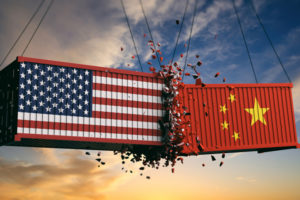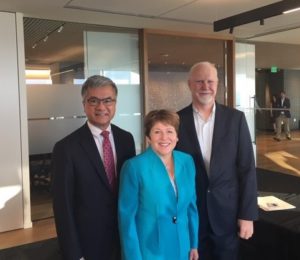 WSCRC along with Davis Wright Tremaine and the UW School of Law Global Business Law Institute hosted a dialogue about US China trade on September 6th, 2019.
WSCRC along with Davis Wright Tremaine and the UW School of Law Global Business Law Institute hosted a dialogue about US China trade on September 6th, 2019.
Representative Rick Larsen (Dem. 2nd District) and Dr. Lisa Brown, Director of Commerce for Washington State, provided comments and then engaged in a discussion moderated by former Ambassador to China Gary Locke. Director Brown outlined the importance of trade with China to Washington’s economy and noted that the State will soon send a trade delegation to China. Representative Larsen commented that there is a consensus in the Congress about what’s wrong with the US-China trade relationship but there is currently no coherent strategy to address the problems.
After a series of probing questions posed by Ambassador Locke, a lively Q and A concluded the session.
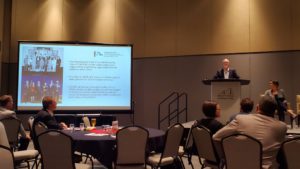 WSCRC’s Executive Director Nor Coquillard spoke at an event in Everett recently titled “Tariffs, Tension and Trade”. The event, co-sponsored by the Economic Alliance of Snohomish County, Snohomish County, and WSCRC, brought together business and civic leaders from the region. In addition to Nor, former Governor Gary Locke and well-known lawyer Nelson Dong of Dorsey and Whitney made presentations about the impacts of the continued trade war with China. Then they all participated in a panel discussion moderated by Everett Mayor Cassie Franklin. The audience was particularly interested in the repercussions of an extended trade war on the economy of Washington state.
WSCRC’s Executive Director Nor Coquillard spoke at an event in Everett recently titled “Tariffs, Tension and Trade”. The event, co-sponsored by the Economic Alliance of Snohomish County, Snohomish County, and WSCRC, brought together business and civic leaders from the region. In addition to Nor, former Governor Gary Locke and well-known lawyer Nelson Dong of Dorsey and Whitney made presentations about the impacts of the continued trade war with China. Then they all participated in a panel discussion moderated by Everett Mayor Cassie Franklin. The audience was particularly interested in the repercussions of an extended trade war on the economy of Washington state.
 iSoftStone North America has been a long-time partner of the WSCRC and proudly hosted WSCRC events at our headquarters. iSoftStone works closely with the WSCRC to promote stronger relationships with China throughout North America.
iSoftStone North America has been a long-time partner of the WSCRC and proudly hosted WSCRC events at our headquarters. iSoftStone works closely with the WSCRC to promote stronger relationships with China throughout North America.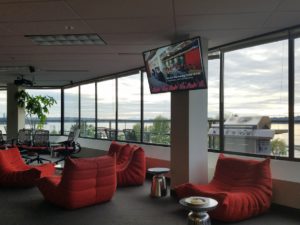
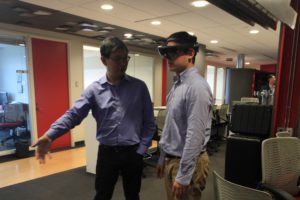


 WSCRC mourns the passing of Sidney Rittenberg, an American whose deep ties with modern China were unparalleled. Sidney was directly involved in many of the key moments of modern Chinese history. On his return from China Sidney settled in the Pacific Northwest Region and lent his expertise to the Washington State China Relations Council. We are grateful for the insights and observations that he shared with the Council which helped to guide the Council to fulfill its mission.
WSCRC mourns the passing of Sidney Rittenberg, an American whose deep ties with modern China were unparalleled. Sidney was directly involved in many of the key moments of modern Chinese history. On his return from China Sidney settled in the Pacific Northwest Region and lent his expertise to the Washington State China Relations Council. We are grateful for the insights and observations that he shared with the Council which helped to guide the Council to fulfill its mission.